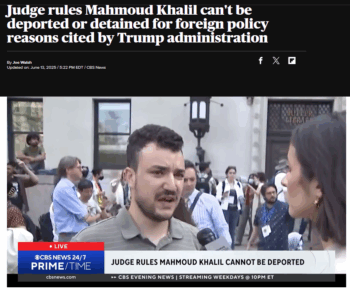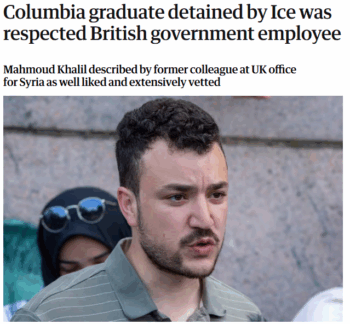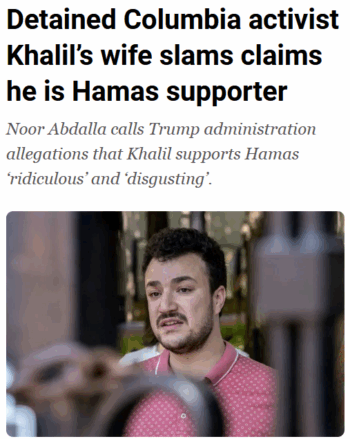Janine Jackson interviewed Defending Rights and Dissent’s Chip Gibbons about freeing Mahmoud Khalil for the June 12, 2025, episode of CounterSpin. This is a lightly edited transcript.

Zeteo (6/12/25)
Janine Jackson: As we record on June 12, the official death toll in Gaza is…something that need not be of specific concern, given ample evidence that no number would, in itself, magically change the indifference of powerful bodies to the ongoing crime of murder, starvation, displacement and erasure of Palestinians by Israel, with critical US material and political support. UN humanitarian chief Tom Fletcher said recently, without trying to compare his experience to that of Gazans, that he has started therapy to deal with his experience, just witnessing trauma on this scale.
But when people speak up about something that bipartisan US politicians and US corporate media support, that criticism becomes suspect, by which is increasingly meant criminal. So here we are with Columbia University graduate—or what Fox News calls “anti-Israel ringleader”—Mahmoud Khalil, charged with no crime, but detained since March.
Chip Gibbons is policy director at Defending Rights & Dissent, and journalist and researcher working on a new history of FBI national security surveillance. Welcome back to CounterSpin, Chip Gibbons.
Chip Gibbons: It’s always a pleasure to be back on CounterSpin.
JJ: There’s always a lot I could talk with you about, but, for today, I know that listeners with horrible news coming at them from all sides may have lost the thread on Mahmoud Khalil. What is the latest on his case, and how good is that latest news? What should we think about it?
CG: As of June 12, when we’re recording this, Mahmoud Khalil is still detained at the LaSalle Immigration Detention Center in Jena, Louisiana. It is a private immigration prison. If you go on their website, they talk about their commitment to family values, but the conditions there—you’ll be shocked to learn this—are not very good. I’m not sure what type of family values they’re talking about.

CBS (6/13/25)
Recently, a judge has ruled on a preliminary injunction that Mahmoud Khalil brought, asking that the immigration provision that [Secretary of State Marco] Rubio relies on, that gives the secretary of state the power to expel someone from the country if they pose a threat to US foreign policy, is unconstitutional as applied to [Khalil], enjoined Rubio from enforcing it against him, voiding the determination that Rubio made, as well as enjoining the Trump administration from enforcing what Khalil’s lawyers alleged, and what I think is not really just an allegation at this point, is a policy of arresting and detaining noncitizens who criticize Israel or support Palestinian rights. The judge has given the Trump administration until Friday to appeal, and has stayed his own order.
Of all the other similarly situated individuals in immigration proceedings over their pro-Palestine speech, the judges have granted them bail pending a final motion. Khalil submitted a motion for bail. It’s never been ruled on, and now the judge has issued this injunction that could potentially set him free, but has given the government until Friday to file an appeal, and it’s unclear, if the government files the appeal, if that will further stay his time in detention.
And Khalil is a father. His child was born while he was detained. He was not able to attend the birth of his child, and for an extended period he was denied a contact visit with the newborn child until a judge intervened.
And the thing we have to remember here, this is very difficult to keep track of, is that Khalil is really in two separate legal proceedings right now. He’s in an immigration removal proceeding, which takes place in immigration court, and immigration court is not part of the “Article Three”—that’s Article Three of the US Constitution—judiciary.
It is part of the Department of Justice. Immigration Judges work for Pam Bondi, the attorney general. You can appeal an immigration judge’s decision to the Board of Immigration Appeals, which is appointed by Pam Bondi, the attorney general, and the attorney general can reverse or modify any decision of the Board of Immigration Appeals. So immigration court is basically a kangaroo court.
At the same time, he’s challenging the constitutionality of this detention, not the removal itself, but the detention as unconstitutional in federal court, with what’s called a federal habeas petition. And the habeas corpus, of course, goes back to before the Magna Carta, but it was enshrined as a basic human right in the Magna Carta, and he’s arguing his detention is unconstitutional.
And the reason for these two proceedings is that immigration courts are very limited in what they can do, beyond the sort of kangaroo court nature that I just described, where the attorney general is usually the party seeking the deportation, and the person making the decision works for the attorney general, and if the attorney general doesn’t like their decision, they can modify it. The Board of Immigration Appeals ruled during the Clinton years that once the secretary of state makes a determination that someone’s presence in the US has adverse foreign policy consequences, they can be removed from the country. There’s essentially no defense, and immigration judges cannot hear constitutional challenges or issues.
On the flip side, federal courts are barred from hearing challenges to the attorney general’s enforcement or commencement of immigration proceedings, but they are allowed to weigh challenges to detention. So Khalil and other similarly situated defendants are using the habeas remedy to challenge the constitutionality of the detention.

Guardian (3/13/25)
In Khalil’s case, it gets very complicated even further, because the government has brought two “immigration charges” against him. One is the claim that his presence poses a threat to our foreign policy. The other is that he misled immigration officials on his application by not mentioning he was part of a student group, which it’s unclear why that would affect his Green Card.
And there’s also allegations about when he did or didn’t work for the British government. He worked at the British Embassy, I think, in Lebanon, and the Trump administration is bringing that up, which I believe was disclosed on his application. And his lawyers have offered information refuting this charge, but the immigration judge has refused to hear it.
The immigration judge, by the way, not only works for the Department of Justice, she’s a former ICE employee. She’s refused to hear it on the grounds that she doesn’t need to make a decision on this, because she has the Rubio determination. And the preliminary injunction only applies, we think, to the Rubio determination, because the judge ruled in the previous ruling he was unlikely to prevail on a constitutional challenge to the misleading application charge.
So that’s sort of the convoluted legal situation we’re in. Khalil is in a removal proceeding in immigration court. He’s in a federal challenge to detention in federal court, and a federal judge has issued an injunction to enforcing the Rubio determination against him, but not the second charge, which an immigration judge has refused to rule on. Rubio’s saying it’s a sole removal basis. And that judge has also issued a stay giving the government time to appeal. So he remains detained even though his detention is likely unconstitutional, and a judge has found that he suffers irreparable harm by this detention.
JJ: I want to lift up a piece that you mentioned that we’re seeing, is that criminality, or the ability to be detained, has to do with something you do having “adverse foreign policy consequences.” I know that folks hear that and are like, “What? What do you mean? If the current administration has certain foreign policy objectives, and I disagree with them, that means if I speak out in opposition, I’m committing a crime?”
CG: So I think we have to remember, and this gets sort of pedantic, but Khalil is not charged with a crime, and the provision is not a criminal provision. It is a provision about whether or not you can be admitted into the US or removed from the US. So Khalil has not been charged with any criminal offense. They’re invoking a provision that says if your presence has adverse foreign policy consequences for the United States…
JJ: Your presence, OK.

Al Jazeera (3/23/25)
CG: …signs a piece of paper saying this is true, or it makes determination of it, you can be deported from the US. So this is not a criminal matter.
What does this provision even cover or does not cover is a really fascinating question. And the judge in the Khalil habeas case has stated that it’s unconstitutional as applied to Khalil, because no reasonable person would have notice that this provision could apply to domestic political speech or domestic speech.
He noted a number of instances when it was used in the ’90s by the Clinton administration, but they were all against people who were accused of criminal conduct in foreign countries. So you had a Saudi national who was accused of terrorism in Jordan; you had an alleged paramilitary leader from Haiti. You had a Mexican official who was accused of a number of crimes; but it was not someone who was in this country and engaged in political speech about a foreign government’s genocide, and therefore no reasonable person would have any notice that this statute could apply to their domestic speech.
JJ: I’m going to keep us short for today, although there are much, much and myriad things we could talk about, but you and I both know that once politicians take up an individual case—Julian Assange, Michael Brown, Mahmoud Khalil—we know that then news media bring out the microscopes. Is this really a good guy? How did he treat his mother? I’m seeing some parking tickets here. There might be some particulars to investigate.
There’s almost a vocational effort to make there be something specific about this person that makes it make sense that they are being targeted. And then the effect of that is to tell everyone listening, As long as you don’t do what this guy did, you’re going to be safe. Why is the Mahmoud Khalil case so important to folks who don’t even know who Mahmoud Khalil is, and don’t understand why it matters?

Chip Gibbons: “This is a case about whether or not we have a First Amendment right to criticize Israel for engaging in a genocide in Gaza, or support the human rights of the Palestinian people.”
CG: This is a case about whether or not we have a First Amendment right to criticize Israel for engaging in a genocide in Gaza, or support the human rights of the Palestinian people. The case is currently about an obscure Cold War immigration provision, and whether or not it can be used to deport a lawful, permanent resident, all of which has profound legal questions for individuals in this country who are immigrants or noncitizens. But at the end of the day, we should not believe this will remain only in the noncitizen realm.
The Heritage Foundation, who laid out a lot of the playbook about using deportations to target student activists, has made it clear their final goal is to equate all protests for Palestine with material support for terrorism. In the past, when we’ve seen immigration enforcement abuse for political policing, J. Edgar Hoover during the Palmer raids; the Los Angeles Eight, who were supporters of Palestinian rights who the Reagan, Bush I, Clinton and Bush II administrations sought to deport, both of those cases preconfigure or forbode larger attacks of civil liberties that eventually affect everyone.
Which is not to say that we shouldn’t care about the rights of noncitizens; we should care about everyone’s free-speech rights.
But if you believe this is going to stay with Green Card holders or student visa holders, the goal is to take away your right to criticize a foreign apartheid state’s genocide, with the eventual goal of taking away your right to criticize US foreign policy. And this is the vehicle for doing it. It starts today, with the visa holders and the Green Card holders, but they will come for the natural-born citizens eventually, too, if they get away with this.
JJ: We’ve been speaking with Chip Gibbons of Defending Rights & Dissent. They’re online at RightsAndDissent.org. Chip Gibbons, thank you so much for joining us this week on CounterSpin.
CG: Thank you for having me back.
This post was originally published on FAIR.